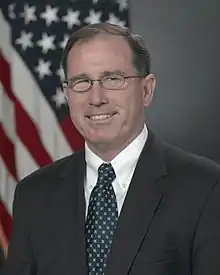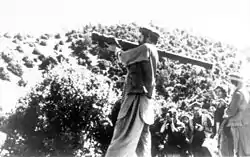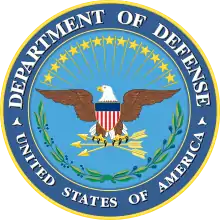Michael G. Vickers
Michael George Vickers (born April 27, 1953) is an American defense official who served as the Under Secretary of Defense for Intelligence (USD-I) within the United States Department of Defense.[1] He was born in Burbank, California.[2] As USD-I, Vickers, who was appointed by President Barack Obama in 2010, was the Defense Department's top civilian military intelligence official. Before becoming USD-I, Vickers served as United States Assistant Secretary of Defense for Special Operations and Low Intensity Conflict.[3]
Michael Vickers | |
|---|---|
 | |
| Under Secretary of Defense for Intelligence | |
| In office March 16, 2011 – April 30, 2015 | |
| President | Barack Obama |
| Preceded by | Jim Clapper |
| Succeeded by | Marcel Lettre |
| Assistant Secretary of Defense for Special Operations and Low-Intensity Conflict | |
| In office July 23, 2007 – March 16, 2011 | |
| President | George W. Bush Barack Obama |
| Preceded by | Thomas O'Connell |
| Succeeded by | Michael Lumpkin (Acting) |
| Personal details | |
| Born | Michael George Vickers April 27, 1953 Burbank, California, U.S. |
| Spouse(s) | Melana Zyla Vickers |
| Children | 5 |
| Education | University of Alabama, Tuscaloosa (BA) University of Pennsylvania (MBA) Johns Hopkins University (PhD) |
| Military service | |
| Allegiance | |
| Branch/service | |
| Years of service | 1973-1983 |
| Rank | |
| Unit | 7th Special Forces Group |
Before joining the Defense Department, Vickers served in the Army Special Forces as both a non-commissioned and commissioned officer, as well as a Central Intelligence Agency (CIA) paramilitary operations officer from their elite Special Activities Division. While in the CIA, he played a key role in the arming of the resistance to the Soviet invasion of Afghanistan.[4]
Career
From 1973 to 1986, Vickers served as an Army Special Forces sergeant, later became a commissioned officer, and then a CIA paramilitary operations officer.
In the mid-1980s, Vickers became involved with Operation Cyclone, the CIA program to arm Islamist Mujahideen during the Soviet–Afghan War. He was the head military strategist for the US, coordinating an effort that involved ten countries and providing direction to forces made up of over 500,000 Afghan fighters.[5]
Later he was Senior Vice President, Strategic Studies, at the Center for Strategic and Budgetary Assessments (CSBA), during which he provided advice on Iraq strategy to US President George H.W. Bush and his war cabinet.[5]
In 2004, he wrote an op-ed piece for USA Today in which he stated that the United States could be successful in Iraq by using a much smaller force modeled on its deployment in Afghanistan.[6]
In July 2007, he was confirmed by the United States Senate as Assistant Secretary of Defense, where he is the senior civilian advisor to the US Secretary of Defense on such matters as "counter-terrorism" strategy and operational employment of special operations forces, strategic forces, and conventional forces.[7]
Regarding ISIS and Al-Qaeda, Vickers has advocated a policy of disruption, of raids intended to distract and keep militants off-balance such that they are unable to organize and execute action against the United States and its forces in Afghanistan, Iraq, and the Middle East.[8]
He retired from government service in April 2015. As of December 2015, it was announced that he had been appointed to the BAE Systems board of directors.
Personal life
He decided to instead enlist in the U.S. Army, applying for service in Special Forces, figuring that they would best prepare him for his ideal occupation in the Central Intelligence Agency.[9] When he took the Army's intelligence test, he received a score of 160 points, the highest score possible. He excelled at virtually every aspect of Special Forces training. He was considered one of their foremost experts in hand-to-hand combat, and he studied Soviet weapons and tactics to an obsessive level. He cross-trained with the Navy SEALs and the British SAS, and even volunteered to parachute behind Soviet lines with a small thermonuclear warhead, should a large scale war break out. He also completed the Army's grueling Ranger School as well as the U.S. Military Free-Fall School.
Later in life, Vickers attended the University of Alabama, where he graduated with honors, and went on to attend the Wharton Business School at the University of Pennsylvania from which he received an MBA.[9] He earned a Ph.D. in 2011 in International Relations/Strategic Studies from the Paul H. Nitze School of Advanced International Studies (SAIS) at Johns Hopkins University under Professor Eliot A. Cohen.
In popular culture

Vickers' role at the Central Intelligence Agency during the Soviet–Afghan War was featured in George Crile's 2003 book Charlie Wilson's War, and in the 2007 movie adaptation in which he is played by actor Christopher Denham.
References
- Secret warrior leaves
- "Sorry Charlie this is Michael Vickers's War," Washington Post, 27 December 2007
- Bio page at the United States Department of Defense
- For guidance on Iraq, look to Afghanistan: Use fewer U.S. troops, not more
- Nomination page at Whitehouse.gov
- http://conversationswithbillkristol.org/video/stephen-rosen/
- "Telemus Group Principals". Robert Martinage. Retrieved 2017-02-20.
External links
- Appearances on C-SPAN
- SOF Advisor - Michael G. Vickers November 14, 2007
- U.S. adapts Cold-War Idea to Fight Terrorists NY Times March 18, 2008
| Political offices | ||
|---|---|---|
| Preceded by Thomas O'Connell |
Assistant Secretary of Defense for Special Operations and Low-Intensity Conflict 2007–2011 |
Succeeded by Michael Lumpkin Acting |
| Preceded by Jim Clapper |
Under Secretary of Defense for Intelligence 2011–2015 |
Succeeded by Marcel Lettre |
